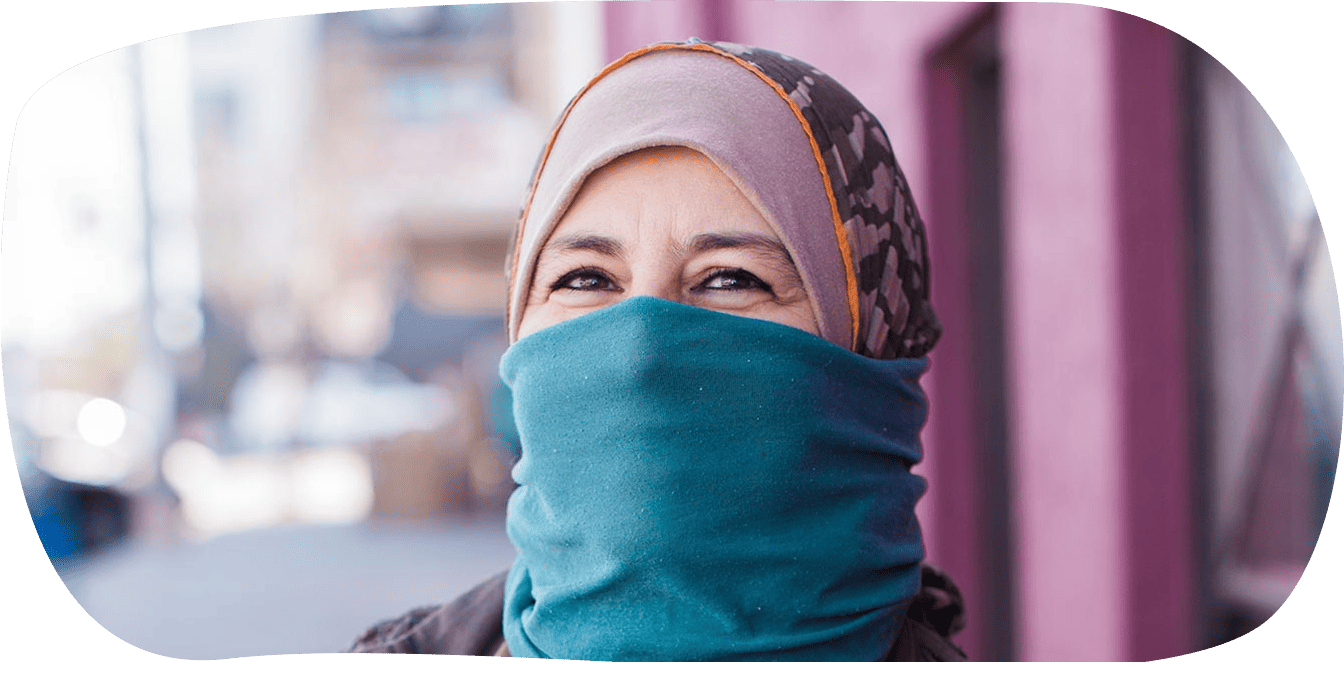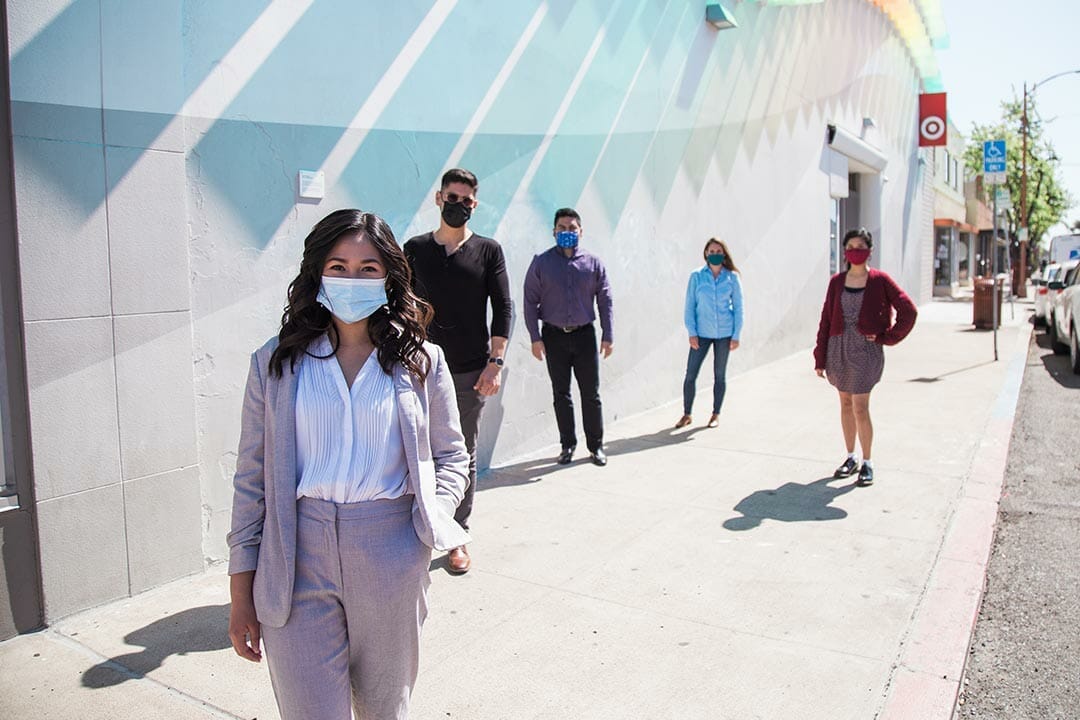HEALTH
Supporting San Diego's Pandemic Response, One Call at a Time

From the start, the coronavirus pandemic has reminded the world that our health depends on each other. Recognizing this undeniable connection, governments across the globe have turned to contact tracing as a critical way to break the chain of COVID-19 transmission at the local level.
While it's not always easy being the messenger, the compassionate communication of timely and fact-based public health information has proven key to helping people navigate this unprecedented time of isolation, illness and unknowns.
"I believe persistence and a passion for genuinely helping others in these types of conversations plays a very significant role," said Danica Pascua, a contact tracer working with PCI, a Global Communities Partner, to support the County of San Diego Health and Human Services Agency's COVID-19 contact tracing efforts. The program focuses on quickly and successfully reaching close contacts of people who have tested positive for the coronavirus and supporting those individuals through the quarantine process to reduce the risk of them further spreading the disease.
"They just need someone who can listen to them and give them guidance on what to do next," Pascua said. "Many people don't necessarily know a lot about COVID-19, so if we can help explain what it is and also give them the resources that they need, that's what makes them trust us."
PCI began collaborating with the County of San Diego's COVID-19 Contact Tracing Program in early September 2020. What began as a small core team of 7 has since grown to nearly 20 contact tracers, who among them speak 11 languages besides English: Spanish, Arabic, Tagalog, Chaldean, Ilocano, Kurdish/Assyrian, Vietnamese, Farsi/Dari, Mandarin, Pashto and Cantonese. Together, they represent the cultural and linguistic diversity of San Diego County and play a critical role in reaching underserved communities with accurate and culturally tailored COVID-19 health information. All team members were trained and certified through the Johns Hopkins COVID-19 Contact Tracing Course. They have received additional specialized training to ensure their skills and information are up to date in an ever-changing environment.
"You have to be patient and try to clarify all the questions that people might have," said Victor Ruiz, one of five binational contact tracers on PCI's team from the U.S.-Mexico border region. "It's a very dynamic environment. It's not a linear process and each person is different, so you have to kind of be a chameleon with each contact."
This ability to quickly adapt and find common ground with the person on the other end of the line has proven to be particularly helpful when reaching out to those who are disproportionately affected by COVID-19, including but not limited to Hispanic and Latino residents.
"I think understanding the cross-border culture and the nuances of that dynamic has been really important. It allows me to navigate the conversations in a more personal way without losing the objective part of my goal, which is keeping them safe as individuals and also keeping the community safe," he said. "Being able to talk to the contacts in their language, they feel more comfortable sharing information. They feel understood, because someone like them is speaking to them."

PCI began collaborating with the County of San Diego's COVID-19 Contact Tracing Program in early September 2020. Together, they represent the cultural and linguistic diversity of San Diego County and play a critical role in reaching underserved communities with accurate and culturally tailored COVID-19 health information.
Each week, PCI traces 265 new contacts assigned to the team by the County after disease investigators conduct interviews with laboratory confirmed COVID-19 cases. Staff use advanced technology and reporting systems to track where each person is in their monitoring process, provide the best client experience, and have the highest likelihood of reaching people to let them know they have been exposed to someone with COVID-19. When needed, PCI can connect individuals to resources such as shelter, food assistance, economic relief and health care services, including mental health support. Operations run seven days a week, including holidays.
"Whenever there's a need, I like to jump in," said Arwa Alkhawaja, a contact tracer on PCI's team who moved to the U.S. from Saudi Arabia. Prior to this job, she worked as a middle school science teacher for 20 years.
"I don't like to just watch. I want to be part of the solution," Alkhawaja said. "And there is a responsibility on everyone, for all of us, to be part of it."
She described a case where a woman in her 80s was living with her two adult children, one of whom has a disability and had contracted the coronavirus. None of them had health insurance.
"[The mother] was telling me how lonely she feels. She was worried about her sons and also about getting sick herself. She was so scared considering her age," Alkhawaja said.
In addition to giving the mother an opportunity to share her fears and frustrations, Alkhawaja counseled the family on how to safely get tested for free and seek medical attention if needed. She also explained how to properly quarantine and the importance of wearing masks and sanitizing their hands.
"It was as if the family was sinking and not knowing what to do, and they were waiting for someone else to come and tell them," she said. "I felt like I helped them and gave them all the resources that they needed. I gave the instructions and told them they were not alone."
I want to be part of the solution, and there is a responsibility on everyone, for all of us, to be part of it.
Arwa Alkhawaja
PCI contact tracer
As of March 5, 2021, PCI had traced a total of 4,610 contacts since the team first began making calls in early September. Now, as San Diego enters a new phase of the pandemic, PCI is collaborating with the County to provide community outreach and education to increase COVID-19 vaccine access and enrollment.
"The dedication of our team blows me away each day. They go above and beyond to make sure the people we reach receive full support, all while navigating the pandemic in their personal lives," said Alina Shaw, PCI's COVID-19 Contact Tracing Program Director. "We are looking forward to putting our specialized skills serving our community to use as we embark in the next phase of the COVID-19 response, making sure that all people in San Diego have equitable access to the vaccine. We are committed to doing all that we can to keep families healthy."
0
traced contacts of COVID-positive community members to provide support and reduce the spread of the coronavirus.
Story by Maureen Simpson
Photos by Sophia Elizabeth Photography

